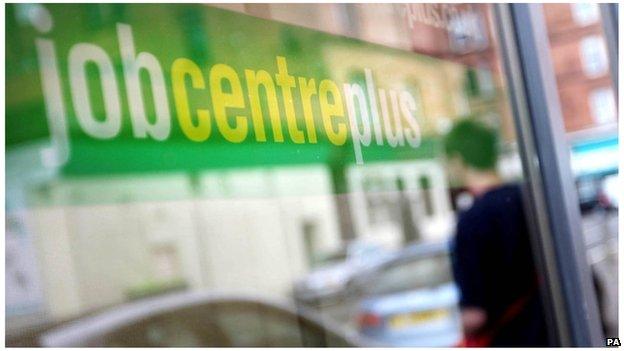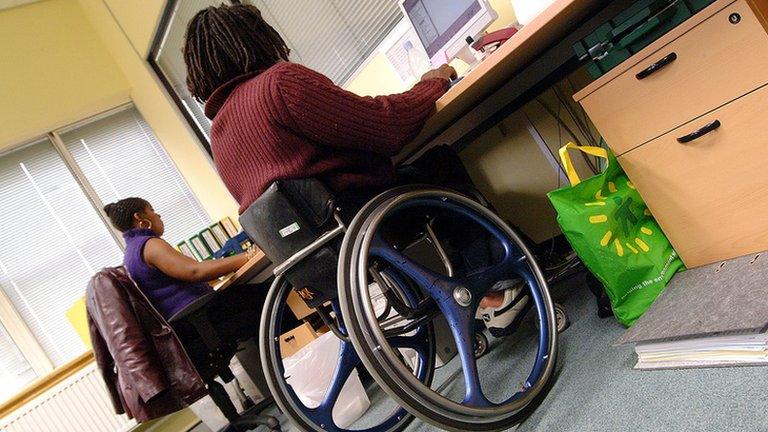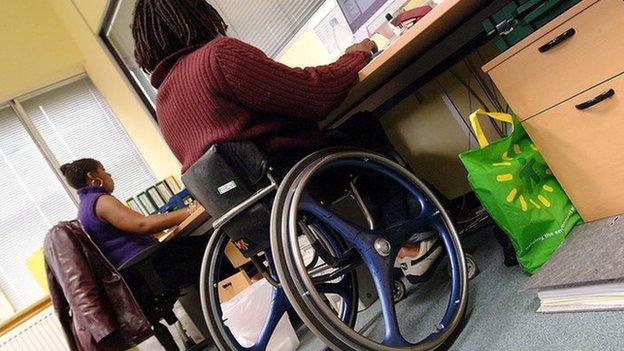Mental health job support scheme piloted
- Published

The government is piloting ways to get more people with mental health problems into work by combining earlier treatment with employment support.
Ministers want to cut benefits spending and get more people into jobs.
Thousands of Employment and Support Allowance (ESA) claimants could be affected by the changes.
The Department for Work and Pensions said treatment would not be mandatory in the pilot scheme but that remained an "idea" for the future.
Those seeking to claim ESA - income support for people who are too ill or disabled to work - currently undergo mandatory tests carried out by a doctor or healthcare professional.
'Caused distress'
These are known as Work Capability Assessments and are aimed at discovering if people are eligible for benefits, or if they are actually fit enough to work.
Critics of the checks say delays and wrong decisions have caused distress to disabled and vulnerable people.
These new pilot schemes will now see mental health assessments, focusing on such issues as anxiety and depression, included in that process. Any subsequent therapy recommendations are not currently mandatory.
It has been reported that some 260,000 ESA claimants, external have mental health issues.

Case study
Martin Elliot, 60, from Guildford, Surrey, has bipolar disorder and depression. He visited his local JobCentre Plus in 2010 after losing his job as an engineer in the oil and gas industry.
"I was interviewed there by job centre people and at the time they wanted to send me on a "prepare to return to work" course. But I wasn't able to work because of the problems I had.
"They made it quite clear that if I didn't go they would stop my incapacity benefits.
"But then in the same building I later had to attend a mental health assessment. This just corroborated all the things that had been said by the NHS and my private psychologists.
"With these new pilot schemes, why duplicate what's available at the JobCentre Pluses with what's already available on the NHS?
"Making it mandatory to have treatment is very, very risky because any treatment needs to match your needs, and it's already difficult for NHS mental health teams to get it right. There needs to be flexibility to understand people's problems.
"If they made me do a treatment through this scheme to keep my Employment and Support Allowance then I'd probably complain officially but do it anyway. Or I might tell them to get stuffed, like I have done in the past."

Several government programmes already assess and support those with mental health difficulties into work or keeping their job, but the new schemes are intended to be conducted earlier than is currently the case.
A report published by the DWP in January, external said there were "significant challenges" in current provision of services.
The first of four government pilots is being trialled at four job centres - Durham and Tees Valley, Surrey and Sussex, Black Country and Midland Shires.
This pilot will test whether combining talking therapy with employment support based on the "individual placement and support" model works better than the usual jobcentre or mental health support for ESA claimants, said the DWP.
Talking therapy usually involves a one-to-one discussion with a therapist.
The other pilots will begin later this year. The government has not yet said what form these will take, but the DWP's January report suggested:
Using group work "to build self-efficacy and resilience to setbacks" faced by job seekers
Providing access to online mental health and work assessment and support
Third parties, commissioned by Jobcentre Plus, to provide telephone-based psychological and employment-related support
In the Sunday Telegraph, external, Lib Dem health minister Norman Lamb moved to quash speculation that the counselling could be mandatory and come with a threat to withdraw people's benefits, saying that "simply won't work".
"It is not a question of whether tough love is a good concept," he told the newspaper.
'Ideas stage'
"You actually need someone to go into therapy willingly."
Tom Pollard, policy and campaigns manager at Mind, said: "If people are not getting access to the support they need, the government should address levels of funding for mental health services rather than putting even more pressure on those supported by benefits and not currently well enough to work.
"Talking therapies can be effective, but it is often a combination of treatments which allow people to best manage their symptoms and engaging in therapy should be voluntary."
A DWP source described the policy as "very much at the ideas stage" and a spokeswoman said there had not yet been any discussion as to how the pilots might be expanded or the costs involved in doing so.
People on ESA currently receive up to £101.15 a week if they are placed in the work-related activity group, where an adviser assists with training and skills.
Those placed in the ESA support group, because of severe restrictions caused by illness or disability, receive up to £108.15 a week.
The government says it spends around £13bn a year on ESA and incapacity benefits.
It estimates that it could save £1.41 for every £1 it spends on this new mental health treatment.
- Published27 March 2014

- Published19 June 2014

- Published11 June 2014
